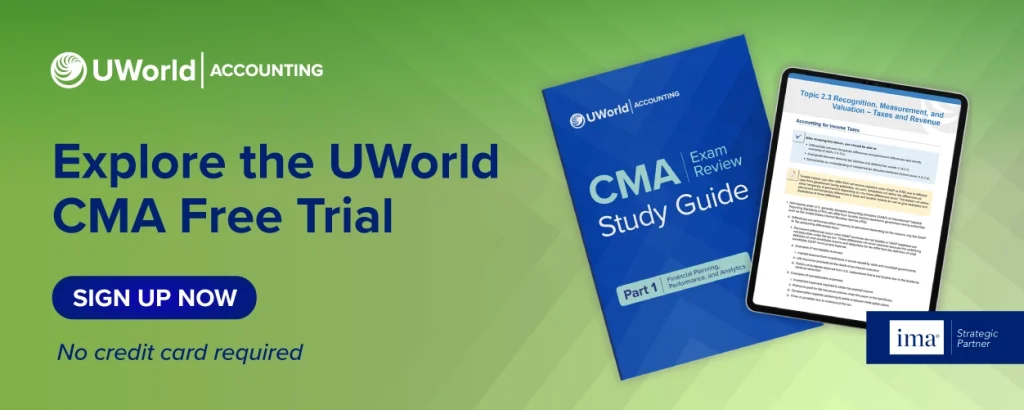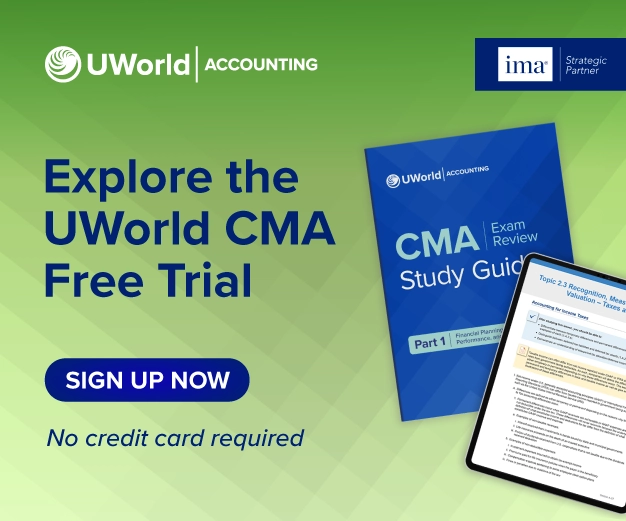What Does a CMA Do?
A Certified Management Accountant (CMA) is an accounting or finance professional who works closely with an organization's top management to develop financial strategies and contribute to the business decision-making process. The CMA certification represents excellence in budget planning and analysis, strategic management, and ethical practice in accounting and finance.
The CMA is an ideal credential if you look beyond number-crunching and would like to get involved in risk assessment and long-term leadership roles. Here's what a typical day looks like in the life of a CMA:
- Analyzing financial data to drive viable business strategies
- Using data-driven insights to project the impact of financial decisions
- Conducting risk analysis for investments, mergers, and acquisitions
- Engaging in cost management and analysis
- Advising board members or executives on ethical, profitable and efficient financial decisions
CMAs combine their accounting and business acumen to become leaders, such as chief financial officers (CFO). The certification creates many career opportunities and makes CMAs highly sought-after professionals.
History of the CMA Certification
In 1919, the National Association of Cost Accountants (NACA) was formed to promote knowledge and professionalism among cost accountants and widen their understanding of management. The association changed its name in 1957 to the National Association of Accountants, which eventually developed the Certified Management Accountant (CMA) program in 1972. Lastly, in 1991, the organization adopted the name “Institute of Management Accountants (IMA).”
Globally, over 140,000+ CMAs provide management services. IMA regulates the CMA exam and works with students and professionals worldwide to broaden its role as a leading organization for accountants and finance professionals. As recently as September 2024, IMA adopted changes to the CMA exam to account for the changing accounting landscape.
Differences Between CMAs and Non-Certified Accountants
The constantly evolving accounting industry demands professionals upgrade their skills to seek better opportunities. Obtaining CMA certification can set you apart from your non-certified peers. Through the CMA, you will hold the edge regarding the strategic insight and analysis to solve complex financial challenges. Here are 3 key ways you stand out as a CMA:
- Financial Strategies: CMAs use the available economic data to project a company's future financial health. They also develop effective strategies to counter challenges by setting a long-term vision.
- Leadership and Decision-Making: As a CMA, you'll be summoned to make high-level business decisions to provide your strong cost accounting and management skills for strategy development. You will work closely with the leadership team and climb the corporate ladder in top management as a potential CFO.
- Cost Management and Risk Analysis: Only a few accounting professionals can do what CMAs do as they dive into cost management and risk analysis. You play a crucial role in organizations that deal with investments, mergers, and acquisitions.
CMA vs. CPA
The CMA and Certified Public Accountants (CPA) designations bring a wealth of opportunities. Becoming a CPA is the best option if you're interested in keeping financial records, taxation, and auditing. CMA is the standard if you’re working toward the bigger decision-making picture and your organization's long-term financial goals.
| Criteria | CMA | CPA |
|---|---|---|
| Focus | Management accounting, financial management, risk analysis, cost accounting | Public accounting, taxation, audit, compliance |
| Roles | Financial analyst, CFO, management accountant | Auditor, tax advisor, public accountant |
| Governing Body | Institute of Management Accountants (IMA) | American Institute of Certified Public Accountants (AICPA) and National Association of State Boards of Accountancy (NASBA) |
| Exam | 2-part exam | 4-part exam |
| Experience | 2 years of work experience in financial management or cost accounting | 1-2 years of work experience under a licensed CPA |
| Global Recognition | 100,000+ globally certified CMAs | 671,855+ CPAs, primarily based in the U.S. |
| Average Salary | $120,000 | $76,485 |
CMA Specialty Areas and Career Opportunities
Whether it's financial planning and analysis, cost management, or corporate finance, each CMA specialty area offers unique challenges and required skillsets. The CMA designation opens the door to exploring these opportunities and impacting an organization's financial future.
Financial Planning and Analysis (FP&A)
Cost Management and Analysis
Corporate Finance
Management Accountant and Reporting
Risk Management
Financial Planning and Analysis (FP&A)
- Budgeting
- Forecasting
- Financial modeling
- Performance evaluation
- Financial analyst
- FP&A manager
- CFO
Cost Management and Analysis
- Product costing
- Cost-benefit analysis
- Cost reduction strategies
- Efficiency improvement
- Cost accountant
- Cost analyst
- Cost accounting manager
Corporate Finance
- Investment analysis
- Mergers and acquisitions
- Funding strategies
- Cash flow management
- Corporate financial analyst
- Director of corporate finance
- Vice president of finance
Management Accountant and Reporting
- Preparing internal financial reports
- Managerial reporting for decision-making
- Cost accounting
- Management accountant
- Corporate controller
- Director of accounting
Risk Management
- Assessing and improving risk management
- Internal controls
- Operational efficiencies
- Risk management specialist
- Chief risk officer
- Audit manager
CMA Salary
An entry-level CMA starting as a financial analyst or cost accountant may earn an average salary of $92,030. As you rise to middle management, such as senior financial analyst, you can expect a salary of $122,000. When it comes to senior and top management positions, such as the director of finance or CFO, expect your salary to range between $150,000 and $195,000+.
Benefits of Earning a CMA Certification
The CMA is a gold-standard certification. With a global network of 140,000+ CMAs, you step into a world of the business elite and place yourself miles ahead of your non-certified peers. Here's why you should consider earning a CMA certification:
- Career Advancement: From managerial roles to top leadership positions, CMAs can earn these positions with their high-value skills in financial analysis and accounting. Most CMAs work with top management, and having cost management experience signals to your supervisors that you're ready to take the next available promotion. It adds credibility to your resume and opens up global opportunities.
- Knowledge Enhancement: From management accounting to financial management, analysis, and cost management, CMAs have it all covered. Their wealth of knowledge and experience puts them in a position to take on specialized roles and translate financial data into actionable insights. As a CMA, you gain hands-on experience in the behind-the-scenes operations of a company and its financial workings.
- Global Recognition: CMA is a global professional certification that teaches you to understand the numbers and leverage your skills to make financial decisions.
- Professional Network: Through IMA membership, CMAs become part of a 140,000+ community. IMA organizes networking events, seminars, and conferences that serve as a platform for like-minded professionals to connect, share industry insights, and collaborate on a large scale. The professional network exposes you to the latest trends and broadens your industry knowledge.
- Salary Growth: CMAs have a higher earnings potential than their non-certified peers. They're better qualified to take management positions and climb the corporate ladder. The 2023 IMA Salary Survey reported that CMAs earn an 18% premium over their non-certified peers.
Skills You Need as a CMA
CMA isn't just about a designation but a combination of skillsets that makes you a go-to person for financial strategy and decision-making. Besides obtaining the CMA credential and becoming a financial management expert, there are essential skills you need to be a successful CMA:
- Strong analytical and communication skills
- Attention to detail
- Time management
- Comprehension of accounting software
- Tech savviness
- Ability to perform financial accounting and analysis
- Understanding of the regulations and standards
How Long Does It Take to Become a CMA?
CMAs must fulfill educational and experience requirements and pass the CMA exam to become certified. You don't need to satisfy these requirements before passing the exam.
- A bachelor's degree from an accredited international or U.S. university
- 2 years of continuous work experience in management accounting and/or financial management
You have 3 years from the date of exam registration to pass the 2-part CMA exam and can submit the educational and experience requirements within 7 years of passing the exam.
Becoming a CMA in the U.S. vs. Other Regions
Unlike a CPA designation, the CMA doesn't have special requirements/additional steps to qualify for international candidates. You can sit for the CMA exam, satisfy its requirements from your home country, and practice globally.
Recognized in over 150 countries, the CMA exam is offered at Prometric centers globally. Each year, 75,000 candidates worldwide sit for at least 1 part of the CMA exam. Currently, over 140,000+ CMAs are practicing globally in different industries and sectors.
You can check the IMA website for the accepted accredited institutions and professional certifications to be eligible for the CMA program.
Frequently Asked Questions (FAQs)
Is the Certified Management Accountant designation worth it?
CMA is a gold-standard professional certification for management accountants. CMAs are in high demand for their financial and strategic expertise. Employers globally prefer candidates with CMA certifications over non-certified accountants.
Can I complete the CMA in 2 years?
Provided you’ve met the educational requirements and professional experience criteria, you can become a CMA in 2 years by passing the CMA exam. However, you can bypass the requirements with a professional certificate such as a CPA.
Is CMA still in demand?
Globally, a vibrant CMA community of over 140,000 professionals is continuing to grow. It’s an evolving profession that’s only increasing, with more businesses requiring CMAs in leadership roles for their strategic and business acumen.





